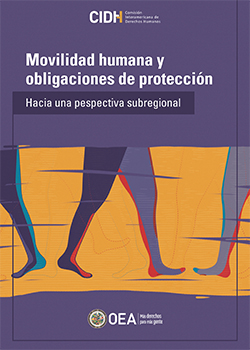
Press Release
IACHR Releases Subregional Report on Human Mobility and the Obligation to Protect
September 28, 2023
Contact info
IACHR Press Office
Distribution List
Washington, D.C. – The Inter-American Commission on Human Rights (IACHR) presents the report Human Mobility and the Obligation to Protect: Toward a Subregional Perspective, which addresses access to human rights and the protection of these rights for individuals in human mobility contexts in northern Central American countries, Mexico, and the United States.
The report reflects the Commission's observations about how migration flows go mainly from northern Central America to Mexico and the United States, are mixed in nature, and feature varied individual profiles. This north-bound mobility trend is linked to expectations of better living standards, more protection, and greater safety in countries like Mexico and the United States.
Countries in northern Central America are countries of origin. However, they are also recipient countries for returned migrants, who are forced to face the conditions that had led to their displacement in the first place and often seek to leave again. This situation shows that human mobility in this subregion is a complex phenomenon, because it always involves more than one State and reflects the political, economic, social, and environmental contexts in all the relevant countries.
In compliance with Strategic Plan 2023–2027—which seeks to build on Strategic Plan 2017–2021—this report presents international and inter-American standards concerning human mobility and identifies the way these standards need to be applied, considering the specific context. Based on this, the report makes recommendations for States to develop and implement public policies and cooperation strategies between countries of origin, transit, destination, and return.
This report is the result of interinstitutional coordination and cooperation between the IACHR and the United Nations High Commissioner for Refugees (UNHCR).
The Commission will continue to address human mobility scenarios with a regional and subregional perspective, putting forward responses based on the principles of shared responsibility and international cooperation and offering States its technical assistance.
A principal, autonomous body of the Organization of American States (OAS), the IACHR derives its mandate from the OAS Charter and the American Convention on Human Rights. The Inter-American Commission has a mandate to promote respect for and to defend human rights in the region and acts as a consultative body to the OAS in this area. The Commission is composed of seven independent members who are elected in an individual capacity by the OAS General Assembly and who do not represent their countries of origin or residence.
No. 229/23
6:00 PM


